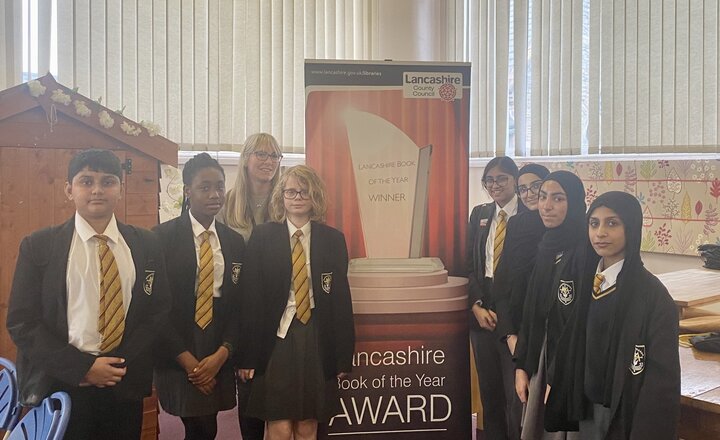“I am determined that I would examine and study all things that are done in this world” Ecclesiastes 1:12-18
Intent
English is a subject in its own right for pupils to understand the language that provides access to the whole curriculum and the wider world. Through English, pupils learn to express themselves creatively, imaginatively and to communicate with others confidently and effectively.
The study of English here at Mount Carmel introduces our young people to the literary canon, enabling them to access rich and engaging poetry, prose and drama from a range of literary periods. English is pertinent in supporting students in their social, moral, and spiritual development, consistently encouraging students to reflect on their own beliefs and values.
Implementation KS3
KS3 curriculum
Our aim for key stage 3 is to instil core skills of reading and writing, spoken language and vocabulary development in a creative, relevant and inspiring way; all lessons give pupils the opportunity to recall and build on previous knowledge in order to develop a strong working memory, providing a platform for discovery of new skills and knowledge, essential for success at Key Stage 4 and beyond.
Topics taught:
Reading:
- Conflict in Romeo and Juliet
- Poetry from other cultures
- American literature - Of Mice and Men
- 21st century play - Our Day Out
- Jealousy in Othello
- 19th century Literature - A Christmas Carol
- First World War Poetry
Writing:
- Short stories
- Descriptive Writing
- Newspaper articles
- Leaflets
- Speeches
- Letters
- Poetry
Speaking and Listening:
- Speaking and Listening projects in Year 7, 8 and 9
Library
Mount Carmel is extremely fortunate to have its own well-resourced library at the heart of the school; it is an integral part of the English curriculum. Pupils are given the opportunity to visit the library once a week in during their English lessons and are encouraged to use the library during break, lunch and after school. The library is a hub for reading and studying which allows students to immerse themselves in literary and academic texts.
How will the subject be assessed? KS3
At key stage 3, assessment is on-going by the means of continual formative assessment which takes place in lessons and homework. At the end of each topic, pupils are complete a final, summative assessment.
Implementation KS4
KS4 curriculum:
For key stage 4, our aim is to ensure all pupils further expand their knowledge and understanding of reading and writing, spoken language and vocabulary development to the highest possible quality; equipping pupils with a strong command of the spoken and written word. This will then maximise potential at GCSE as well as developing skills of language which are essential to participating fully as a member of society.
Assessment Objectives:
AO1: Identify and interpret explicit and implicit information and ideas
select and synthesise evidence from different texts
AO2: Explain, comment on and analyse how writers use language and structure to achieve effects and influence readers, using relevant subject terminology to support their views
AO3: Compare writers’ ideas and perspectives, as well as how these are conveyed, across two or more texts
AO4: Evaluate texts critically and support this with appropriate textual references
AO5: Communicate clearly, effectively and imaginatively, selecting and adapting tone, style and register for different forms, purposes and audiences. Organise information and ideas, using structural and grammatical features to support coherence and cohesion of texts
AO6: Candidates must use a range of vocabulary and sentence structures for clarity, purpose and effect, with accurate spelling and punctuation. (This requirement must constitute 20% of the marks for each specification as a whole.)
AO7: Demonstrate presentation skills in a formal setting
AO8: Listen and respond appropriately to spoken language, including to questions and feedback on presentations
AO9: Use spoken standard English effectively in speeches and presentations.
How will the subject be assessed? KS4
Pupils sit two internal assessments in formal conditions (PPEs) and these are used to inform additional learning support strategies. These are at the end of year 10 and in Autumn Term 2 in Year 11.
Enrichment and / or extra-curricular activities
We provide enrichment opportunities in English to enhance our curriculum and stimulate our pupils.
- Visiting authors and poets
- Journalism Club
- Creative writing club
- Lancashire book of the year
- Talk the Talk Oracy workshops
- Live theatre trips
Impact:
Next steps (College, University, career)
What can the subject prepare our pupils for?
The English curriculum encourages curiosity and debate, whilst also being designed to support all students in becoming effective communicators, critical thinkers and creative writers. After studying English here at Mount Carmel, students will have a broad and extensive use of vocabulary, enabling them to confidently present ideas in speaking and writing. These aspects, we believe, are widely applicable across the wider curriculum, whilst also providing students with the tools to succeed in further education, careers in a rapidly changing world.
English language and literature provides our young people with the foundations that offers a myriad of opportunities after school such as: media and journalism, librarians, creative writers, teachers, speech and language therapist or an editor. This is just a small selection of career options available.
Additional resources:
English Language specification:
https://www.aqa.org.uk/subjects/english/gcse/english-language-8700
Revision:
Mr Bruff – YouTube https://www.bbc.com/bitesize/examspecs/zcbchv4
Seneca – English Language
BBCBitesize/Revision World – past papers
English Literature specification:
https://www.aqa.org.uk/subjects/english/gcse/english-literature-8702
Revision:
MrBruff - YouTube https://www.bbc.com/bitesize/examspecs/zcbchv4
https://www.gcsepod.com/ - compulsory revision
Seneca learning – all GCSE literature texts
Related News
Author visit
